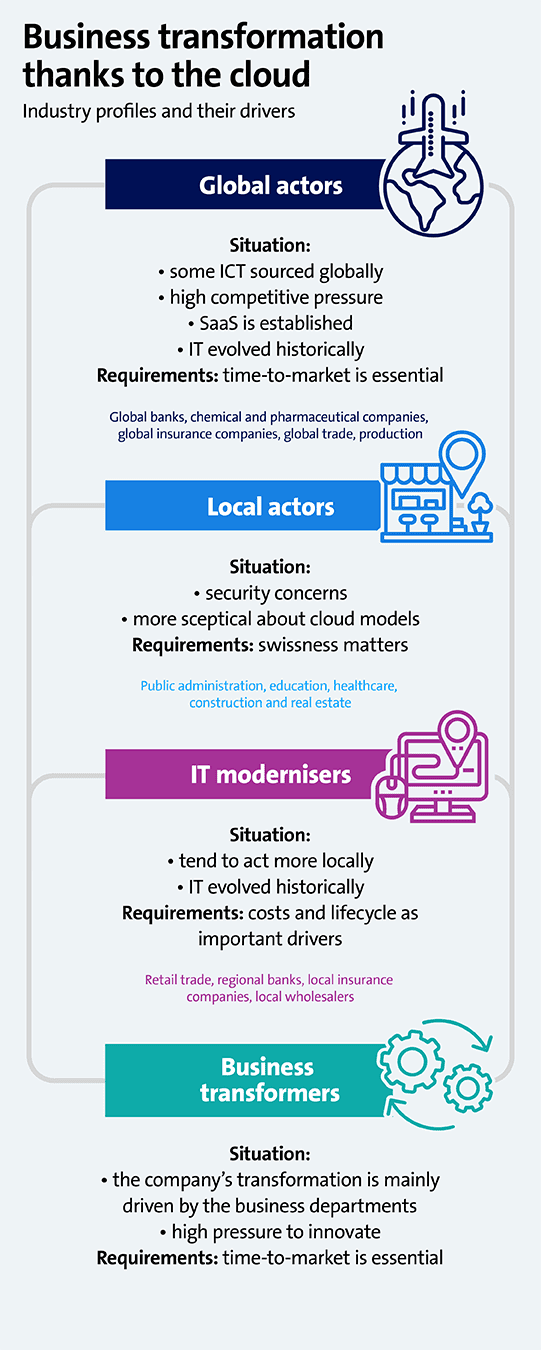Survey: the cloud in Swiss companies
Innovation unleashes the cloud
Swiss companies are increasingly relying on the cloud – some industries more so, others are still reluctant. One thing’s for sure: cloud technologies play a central role in any business transformation – even if this role varies from industry to industry.
Text: Christoph Widmer,
Today, the cloud is an integral part of the IT landscapes of Swiss companies. This is the conclusion reached by MSM Research in this year’s study “Der Schweizer Markt für Cloud Computing” (The Swiss Market for Cloud Computing). According to the authors of the study, the pure IT in-house operation is receding into the background, companies today mostly rely on a mix of their own infrastructure and private or public cloud. This is also reflected in IT expenditures: in 2018, Swiss companies spent less on internally operated IT than in the previous year. In the same period, CHF 5.6 billion went to external sourcing service providers – 15% more than in 2017.
But why are Swiss companies even investing more in the cloud at all? What do they expect in return from cloud providers? Are there industry-specific differences? Swisscom wanted to learn more and spoke to 170 customers about the opportunities and challenges they face as they move to the cloud.
Security is a cloud driver today
In addition to faster time-to-market, cost reduction is one of the main drivers: the cloud eliminates the need to spend money on physical IT infrastructure. One-off, high investment costs thus become flexible operating expenses. For this reason, respondents also mentioned SaaS solutions as another cloud driver: payment for the sourced software is usually based on use and thus contributes to an IT cost structure that can be accurately calculated. As the end-of-life of their own IT infrastructure approaches, companies are also increasingly considering cloud technologies. And last but not least, because corresponding providers provide additional functions: from IoT platforms to analytics tools and – as in the case of Microsoft Azure – bot services.
In addition, many companies recognise the security benefits of the cloud. An amazing result: “Originally, IT security was seen as an inhibitor when it came to cloud migration,” explains Michael Bänteli, Senior Business Consultant at Swisscom. “With the increasing number of cyber attacks, however, companies are realising that they will have to invest an enormous amount in order to achieve the same security level as a cloud service provider. This is why the cloud is particularly attractive today for security reasons.”
Requirements: from time-to-market to “Swissness matters”
Even though these main drivers stood out in the survey, some companies responded differently. At the same time, they also expressed different expectations of the cloud. Four industry profiles emerged from these differences:
- Global actors: among the globally active companies are above all chemical, pharmaceutical and retail groups as well as companies from the banking and insurance sectors. As internationally operating companies, they are more affected by digital transformation than other companies and are exposed to particularly high competitive pressure. A fast time-to-market for their own products and services is essential for them – which is why cloud technologies are gaining in importance. They already use some global IT services such as SaaS solutions, but at the same time they also have an IT infrastructure that has evolved historically.
- Local actors: public administrations and the education, health and construction sectors are still sceptical about the cloud – probably also because the pressure to innovate is not yet strong in these sectors. “Swissness matters” is their credo, and not just for regulatory or legal reasons: companies also expect to be able to solve problems quickly due to their proximity to the provider – especially with business-critical applications.
- IT modernisers: this category increasingly includes retailers and local wholesalers, as well as regional banks and local insurance companies. In contrast to local actors, however, IT modernisers are already exposed to greater competitive pressure. They know they need to digitise their IT and business models to stay competitive. In this context, they already recognise the potential of the cloud: the main reasons given by IT modernisers for cloud migration are lower costs and the end of the lifecycle of their own IT infrastructure which has evolved historically.
- Business transformers: the business transformers can be found in all industry profiles. The further development of their individual companies is mainly driven by the business departments. They recognise the high pressure to innovate and primarily strive to reach the fastest possible time-to-market. The relevant decision-makers are thus intensively engaged with the question of the cloud.

Each industry profile aims to transform its own business. Cloud services are an absolute must if companies want to achieve this aim.
Hub for business transformation
Especially on the basis of the business transformers we can see: the need for a transformation in the company exists in all industry profiles – even if it does not appear to be the case at first glance. “It is only natural that a public administration does not have to transform as quickly as a manufacturing company, for example, which is exposed to much greater competitive pressure,” explains Michael Bänteli. “As a result, it will take more time with the transformation. But one thing is clear: the transformation must and will take place.”
Migration to the cloud plays a key role here: it becomes the hub for the digital transformation of every company. No matter whether blockchain, IoT, chatbots or big data – providers make new technologies available mostly in the Cloud. “The cloud is only a tool,” Michael Bänteli notes. “As soon as I start looking at how to transform my business, I need to understand how technology can contribute to this transformation. At the moment, I am inevitably being confronted with the issue of the cloud. It gives companies the technological edge they need to survive in the marketplace.” The cloud is thus becoming the key technology that makes business transformation possible for every company. From public administration to the globally active retail group: companies today already have to intensively explore the question of how the cloud contributes to optimising their own business processes – or even to changing their own business model. Because no one and no industry can escape digital transformation. And the competition doesn’t sleep.

Newsletter
Would you like to regularly receive interesting articles and whitepapers on current ICT topics?
Other readers were also interested in:


